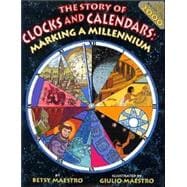
The New copy of this book will include any supplemental materials advertised. Please check the title of the book to determine if it should include any access cards, study guides, lab manuals, CDs, etc.
The Used, Rental and eBook copies of this book are not guaranteed to include any supplemental materials. Typically, only the book itself is included. This is true even if the title states it includes any access cards, study guides, lab manuals, CDs, etc.
Although January 1, 2001, will officially begin the new millennium, the festivities will start a year before that date, when New Year's Eve is celebrated, December 31, 1999. People all over the world are looking forward to this rare event with great excitement. But what makes this date and time so special? What is all the fuss about?
The year 2000 is both a great milestone, a time to mark two thousand years of human achievement, and a historic beginning, the entry into anew thousand-year period - a new millennium. It is also an important time for people of the Christian religion, who will be celebrating the two-thousand-year anniversary of the birth of Jesus Christ.
People mark the passing of celebrate birthdays by counting the years.Each year we celebrate birthdays and anniversaries, counting the years since the people we know were born or married.Even one year can seem like a very long time, so the passing of one hundred years - a century - has always been given special notice.A thousand years is ten times as long as a century, so a new millennium is a truly awesome event.
But even though the year 2000 seems very important to us, it is really only a tiny part of the long story of time, where a year is shorter than the blink of an eye.A millennium is a very long time in human history but only a short time in the history of our planet and universe.
Our universe is probably at least twelve billion years old, and our earth is about four and a half billion years old. It is difficult for us to imagine such long periods of time. A billion is a really large number - more than a hundred, more than a thousand, more than a million. A billion years is made up of one million millennia.
So our earth has lived through millions of millennia, and scientists now think that Homo sapiens - humans like us - could possibly have lived on earth for as many as two hundred millennia. Why, then, is everyone making such a fuss about the year 2000? And how can this be only the year 2000 when our earth is so much older and people have been around for such a long time?
The answer is that it is only the year 2000 on the Gregorian calendar - the calendar most people use. There are many other calendars. The year 2000 will begin in the year 5760 on the Hebrew calendar and in 1420 on the Muslim calendar. It will be 4698 on the Chinese calendar. So what year is it really? There is no one answer. It depends on what calendar you use and how long ago your calendar began counting the years. But the Gregorian calendar is the standard calendar used around the world, and for everyone who uses that calendar, it will be the year 2000.
A calendar is one way to keep track of time. We look at it every day to see what day, month, or year it is. A clock also helps us to measure time. We look at it to see if it's time for school or soccer practice or bed. Everyone needs to know what time it is, so clocks and calendars are important in our lives.
The Story of Clocks and Calendars
Marking a Millennium. Copyright © by Betsy Maestro. Reprinted by permission of HarperCollins Publishers, Inc. All rights reserved. Available now wherever books are sold.
Excerpted from The Story of Clocks and Calendars: Marking a Millennium by Betsy Maestro
All rights reserved by the original copyright owners. Excerpts are provided for display purposes only and may not be reproduced, reprinted or distributed without the written permission of the publisher.